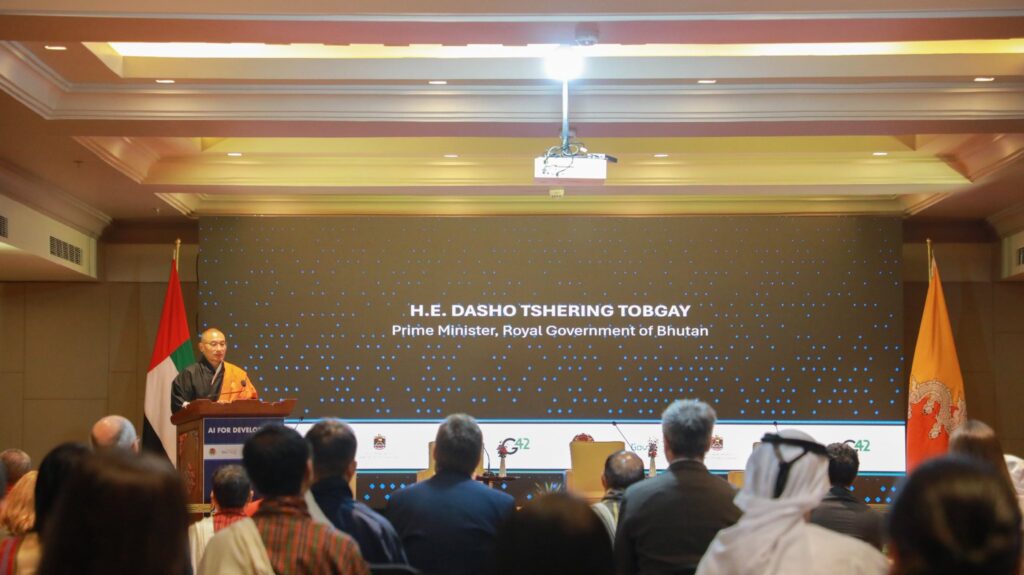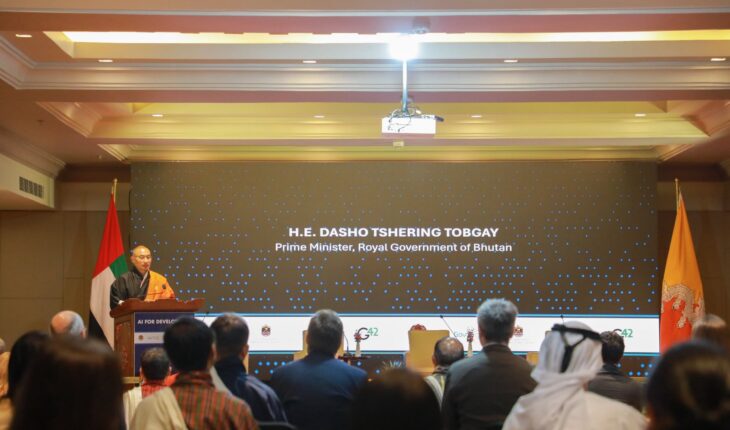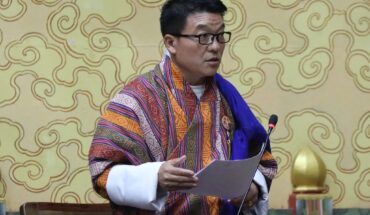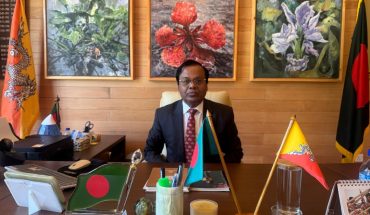
KINZANG DORJI TSHERING
Thimphu
Prme Minister Tshering Tobgay delivered a passionate and wide-ranging keynote address at the nation’s first Artificial Intelligence (AI) Workshop in Thimphu on 15 July.
The workshop is being held in partnership with the government of the United Arab Emirates, reflecting growing cooperation between the two countries in the field of digital transformation.
Beginning with a personal reflection, the PM said he was deeply excited about the opportunity to launch this initiative.
Though his office is located near his residence, he described the mental and strategic journey behind organizing the workshop as one that extended far beyond physical proximity.
He noted that this was a “human” and personal undertaking, with careful planning aimed at expanding national capacity and global engagement.
He welcomed all participants warmly, especially dignitaries from international institutions.
“A very good morning and warm welcome to all my distinguished guests,” he said, extending specific recognition to Ambassador Abdul Nasir, representatives of Oran Science and Technology, Miss Captain Dean, and experts from Eurasia.
The PM acknowledged their presence and support as instrumental to the success of the event.
The PM highlighted that the idea for this workshop was conceived in February during his visit to Dubai, where he explained Bhutan’s digital priorities to His Highness Sheikh Khalifa bin Tahnoun Al Nahyan.
The PM said His Highness immediately saw the importance of the initiative and agreed to support Bhutan, marking this event as a first-of-its-kind capacity-building experiment held in a third country, outside the UAE.
Expressing his sincere gratitude, the Prime Minister extended appreciation to His Highness and the UAE government for sponsoring the workshop.
“This is a generous and significant gesture,” he said, thanking the UAE’s Ambassador for his personal involvement in making the event possible.
PM emphasized that the workshop holds considerable value not only for Bhutan but also for the global dialogue on AI.
He stated that the timing of this initiative could not have been better, as many nations, including Bhutan, are embracing technology to ensure development that is both transformative and equitable.
Quoting global perspectives, he recalled that AI has been described as a force with immense potential to improve lives across the world.
However, he warned that the development of AI also presents serious challenges. “Some experts have called AI a world where those who control algorithms and have the resources for education gain too much power,” he said.
The PM added that while small and resource-deprived countries risk being left behind. He also noted concerns that AI, if left unregulated, may threaten to build inequality, spread disinformation, and increase instability.
He acknowledged that while the risks are real, international efforts—particularly those led by the United Nations—are working to bridge systemic gaps and create equitable governance models for AI.
PM said Bhutan is proud to participate in this international call, and that the government of the UAE found in Bhutan a partner committed to helping build skills and capacity for AI development.
He affirmed Bhutan’s identity as a small country with big ideas and deep values, and described how the government is now fully adopting digital transformation as a key part of economic reform.
The goal, he stated, is to evolve into a knowledge- and innovation-based economy. He expressed confidence that the workshop would significantly contribute to building capacity in AI, which is a critical step in Bhutan’s national transformation.
Bhutan’s collaboration with the UAE, he said, reflects shared values of using technology for good.
He noted that this partnership is especially meaningful given that the UAE, like Bhutan, believes in promoting wellbeing and happiness through development.
PM said the workshop’s outcomes would be shared in upcoming international forums, including events hosted by the United Nations, signalling how important this effort is for Bhutan and its global partners.
He emphasized that Bhutan’s approach to digital transformation is grounded in the belief that technology should enhance people’s wellbeing and support the sustainable development of future generations.
Over the past decade, Bhutan has made consistent efforts to build and strengthen its digital infrastructure. This includes initiatives to improve public service delivery, the launch of a national e-governance mandate, and the introduction of a digital flagship program built on core principles of innovation.
The Prime Minister noted that Bhutan had recently climbed from rank 133 to 103 in the UN’s e-Government Development Index — a reflection, he said, of progress achieved through people-cantered reforms.
Looking ahead, he said the current Five-Year Plan includes goals for integrating emerging technologies, particularly artificial intelligence, into public services.
“We are already beginning to see good results,” he said. “But this is only the beginning.”
He stated that Bhutan’s long-term national ambition is to double its gross domestic product in the next 25 years, and to become a developed country within ten years.
Achieving this would require sustained annual growth of nearly 10 percent.
Artificial intelligence, he said, will play a central role in this transformation, particularly across three key sectors: hydropower, agriculture, and tourism.
In the hydropower sector, AI will support predictive maintenance, efficiency, and performance monitoring. “
You need clean and renewable energy to power AI,” he said, pointing out that Bhutan is well-positioned to lead in this space both in the region and globally.
In agriculture, AI offers the ability to enhance productivity, support better planning, and improve food security. The PM said that AI can provide farmers with access to data on climate, soil conditions, and planting cycles, all of which can transform traditional farming systems into modern, responsive practices.
In tourism, AI will elevate visitor experiences and strengthen Bhutan’s high-value, low-impact tourism model. Through smart systems, AI can help optimize travel routes, monitor environmental impact, and ensure quality service without compromising cultural authenticity or sustainability.
Across all these sectors, the PM emphasized the importance of integrating AI not only as a technological tool, but as part of Bhutan’s broader digital transformation agenda.
“Our vision is to build an intelligent nation,” he said, explaining that this requires a comprehensive national effort to reimaging governance, society, and the economy through digital platforms, AI systems, and education.
He confirmed that Bhutan is in the process of developing a national AI policy, which will define how the country will deploy artificial intelligence to enhance wellbeing, preserve cultural identity, and achieve sustainable development.
However, the PM cautioned that while these efforts are vital, they represent only the beginning.
“We now need to invest in infrastructure, skills, and innovation,” he said. “And we need partnerships, because no country can do this alone.”
He expressed hope that Bhutan will benefit not only from AI’s economic advantages but also from increased international investment in technology and knowledge-sharing.
He quoted Australian philosopher Toby Walsh, who said that countries that lead in developing technology tend to capture its economic benefits — but that when the same technology poses existential risks, those risks are shared by all.
“The biggest risk with AI is not that it will fail,” the PM concluded. “The biggest risk is that it will succeed — without governance.”
He called for wise and ethical leadership both at home and internationally.
“AI needs smart policies and wise governance. It must be inclusive and human-centric,” he said. “Let us make sure that AI development and governance go hand in hand.”
Ending on a hopeful note, the Prime Minister reiterated that Bhutan’s commitment is not just too digital progress, but to people-cantered transformation.
“Let us use technology to empower our people,” he said. “And let us ensure that AI always remains in service of humanity.”




